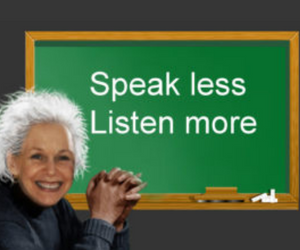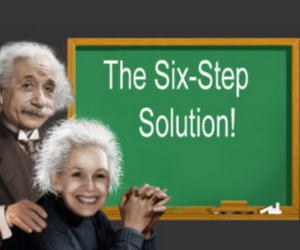Knowledge Services: Crucial in Today’s Knowledge Economy
If you’re beautifully organized, you can quickly find all your documents when you need them. However, if you’re like most people, the frustration and lost time spent trying to locate a needed document can be seriously irritating.
However, your worst experience trying to retrieve a missing piece of information pales in comparison to what regularly happens in large organizations. The question of “Where do I find this?” uses up enormous amounts of time and resources.
Or worse, the information can’t be found at all, and the people who need the information have to develop it again from scratch. While reinventing the wheel, they need to go through the entire learning process all over again and they’re likely to duplicate past mistakes since they’re unable to benefit from experience.
To see how this plays out in actual practice, and then what can be done about it, Guy St. Clair, the founder of SMR International, gives two examples from his professional experience. One involves the fact that the information was never retained and the other, is, the information exists but just can’t be located.
He’s disguised the names of the countries and agencies involved, but the gist of the stories is entirely accurate. See if you’ve experienced either kind of dysfunction in your own organization.
The Information Doesn’t Exist
For the first example, suppose you work for a UN agency that has built wells in Africa. This effort has improved the health and well-being of thousands of people. Funds for these efforts came from donor countries, and in the past dozens of countries have given grants for building these wells.
However, there’s a problem. When the well-building projects were completed, the donors, took a figurative victory lap, and then moved on to other efforts.
Typically, they didn’t spend the money needed to record and catalogue how they accomplished the task. Then, when a fresh grant comes in for building more wells, the agency lacks the detailed directions on how they built the previous wells.
The agency needs to figure out all over again such factors as costs, time-lines, reliable contractors, area experts and on and on. Scarce money and resources get wasted re-inventing how to build wells.
The Information Can’t Be Found
The other kind of information loss that St. Clair likes to help prevent is, say you run a large PR firm that does jobs for the XYZ Corporation. Then you get a contract for a similar task from another client.
To your consternation, neither you nor anyone else can locate the records that you know exist. You’ve spent thousands of hours on research, yet the research is useless to you now that you need it again.
In this case, the task of saving the content and tagging it for retrieval was turned over to a new hire who didn’t understand the terminology. He input the data into the company database in such a way that no one else can find it.
How to Avoid These Problems
In today’s workplace — whether it’s a business, a non-profit, a not-for-profit, or any other type of organization — we hear all the time about “big data,” “too much information” and similar descriptions, and the examples described here are typical.
“One way to think about it,” St. Clair says, “is to understand that all this data, information, and everything else everyone in the company knows is the company’s knowledge, its intellectual capital, and it’s an asset clearly recognized as currency in today’s management environment. But how do we get people use that currency, to share knowledge?”
St. Clair’s solution? He encourages organizations to take advantage of the relatively new specialty of knowledge services.
“It’s an approach to knowledge-sharing,” St. Clair says. “Knowledge services brings people with academic training in this work into the organization. We call them “knowledge strategists” or “knowledge services professionals,” and they are the people who know all about retaining and accessing an organization’s information and knowledge in the most efficient and cost-effective way.
And they don’t do it alone: In St. Clair’s view, the organization’s senior leaders also have a role in the process. “It’s a cooperative effort,” he says. “Senior leaders need to take responsibility for knowledge management, to share and justify to other C-suite people the importance of having trained knowledge services professionals in the organization. And when both knowledge strategists and senior leaders work together, the organization is better managed and more successful, functioning as a knowledge culture.”
For more information on knowledge services, visit St. Clair’s blog at: www.smr-knowledge.com. You can also e-mail him at guystclair@smr-knowledge.com or call him at 917 797 1500.
Search Articles
Latest Articles
Dancing Warriors: How Russia’s Propaganda is Impacting Professional Stages
https://foreignpress.org/journalism-resources/dancing-warriors-how-russias-propaganda-is-impacting-professional-stages Publication –foreignpress.org
Taking the Panic Out of Panic Attacks—With Technology
https://foreignpress.org/journalism-resources/taking-the-panic-out-of-panic-attackswith-technology Publication –foreignpress.org
An Evening Dedicated to Mental Health and Recovery in War-Torn Ukraine
https://foreignpress.org/journalism-resources/an-evening-dedicated-to-mental-health-and-recovery-in-war-torn-ukraine Publication –foreignpress.org
Ukrainian Kids Get a Vacation from War When a New Hampshire Community Adopts Them
https://foreignpress.org/journalism-resources/ukrainian-kids-get-a-vacation-from-war-when-a-new-hampshire-community-adopts-them Publication –foreignpress.org
Subscribe to Updates
About Author

Mitzi Perdue is the widow of the poultry magnate, Frank Perdue. She’s the author of How To Make Your Family Business Last and 52 Tips to Combat Human Trafficking. Contact her at www.MitziPerdue.com
All Articles
Substance Abuse and the Family Business
Substance Abuse and the Family Business When it comes to substance abuse, members of a family business are no more immune than the rest of the population. However, as family business advisor Loyd Rawls points out, the consequences can be more dire because serious...
Infertility: Advances In Treatment
Infertility: Advances In TreatmentAge and Infertility are Linked Infertility affects roughly 12% of women. By the time a woman is in her early 40s, her chance of infertility rises to 20%. It’s a particularly difficult problem for the older woman because the quality...
Career Advice for Young People: Shut Up and Listen!
Career Advice for Young People: Shut Up and Listen! Jack Tatem, a former Perdue Vice President, has some serious advice for young people. It’s simple and it can make a big difference in your career. It has to do with listening. The advice is, “Shut up and listen!” He...
Embedding The Family’s Values by Creating an Ethical Will
Embedding The Family’s Values by Creating an Ethical WillOriginal Article written by Mitzi can be found here. Much as I admired Frank Perdue for his success with his family poultry business, I admired him even more for his success as a family man. Since the happiness...
6-Step Solution to Almost Any Problem
6-Step Solution to Almost Any Problem 1. Describe the Problem. Preferably do this in writing. The act of putting the problem into words can clarify your thinking. 2. Write Down the Obstacles. Although I’m a fan of positive thinking, I’m also a fan of research...
A Diabetes Management, Current Therapies
A Diabetes Management, Current Therapies The Bionic Pancreas Offers New Hope For type 1 Diabetes There’s good news for those with type 1 diabetes. The FDA has just approved a device (Medtronic MiniMed 670G) that automates keeping their blood sugar at healthy levels. ...




